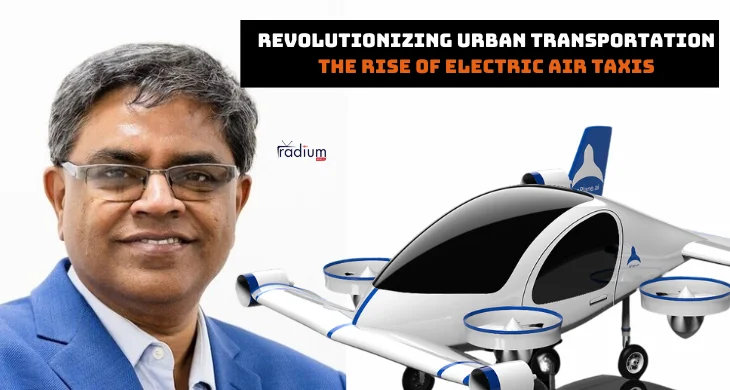In recent years, the idea of electric air taxis has sparked widespread interest and excitement. These futuristic vehicles offer a solution to the perennial problems of traffic congestion and air pollution, presenting a vision of cleaner, more efficient urban transportation. As technology advances, startups like The ePlane Company and established players like InterGlobe Enterprises are leading the charge towards making electric air taxis a reality. Their innovative approaches and ambitious plans signal a shift towards a more sustainable and convenient mode of intra-city travel. Let’s delve deeper into this rapidly evolving landscape and uncover the transformative potential of electric air taxis
The ePlane Company’s Vision
Satya Chakravarthy is the CEO of The ePlane Company, driving the development of electric vertical takeoff and landing (eVTOL) aircraft. The company stands as a pioneer in crafting efficient and adaptable vehicles designed to combat urban congestion and offer groundbreaking solutions for emergency medical services. With a keen eye on innovation, The ePlane Company is set to unveil its inaugural certifiable prototype by March 2025, marking a significant milestone in the realm of sustainable transportation.
Under Chakravarthy’s guidance, The ePlane Company has prioritized the creation of versatile aircraft capable of addressing various urban challenges. These aircraft not only promise to revolutionize transportation but also offer life-saving capabilities as air ambulances when needed. By focusing on the development of eVTOLs, the company aims to redefine the way people commute within cities, making travel faster, safer, and more environmentally friendly.
The upcoming launch of the first certifiable prototype represents a culmination of years of research, development, and meticulous planning. It signifies The ePlane Company’s commitment to advancing sustainable aviation technology and ushering in a new era of air transportation. With this prototype, the company aims to demonstrate the feasibility and viability of electric air taxis, setting the stage for widespread adoption in the near future.
As The ePlane Company continues to push the boundaries of innovation, it remains dedicated to creating a cleaner, more efficient mode of transportation that enhances connectivity and accessibility for people around the world. Through its pioneering efforts, the company is poised to make a profound impact on urban mobility and emergency medical services, paving the way for a brighter and more sustainable future.
Drones for Commercial Use
Alongside its groundbreaking work on eVTOL aircraft, The ePlane Company is diversifying its offerings by entering the commercial drone market. These drones represent a leap forward in logistics and aerial delivery services, capable of transporting payloads ranging from 2 to 50 kilograms. With such versatility, they promise to revolutionize various industries, from e-commerce to emergency response.
The company’s plans include the launch of both basic and enhanced categories of drones, catering to a wide range of applications and requirements. Basic drones will provide efficient and reliable solutions for tasks such as package delivery and aerial surveillance. On the other hand, enhanced drones will offer advanced features and capabilities, making them ideal for specialized tasks like search and rescue operations or environmental monitoring.
The ePlane Company’s foray into the commercial drone market underscores its commitment to innovation and addressing emerging market needs. By leveraging cutting-edge technology and expertise in aerospace engineering, the company aims to set new standards for performance, reliability, and safety in the drone industry.
These drones are poised to transform the way goods are transported and services are delivered, offering faster, more efficient, and environmentally friendly alternatives to traditional methods. From facilitating last-mile delivery in urban areas to providing critical support in disaster relief efforts, the potential applications of these drones are vast and far-reaching.
As The ePlane Company continues to develop and commercialize its drone technology, it seeks to unlock new opportunities and drive positive change in industries around the world. By delivering innovative solutions that meet the evolving needs of society, the company is positioning itself as a leader in the future of aerial mobility and logistics.
InterGlobe Enterprises’ Ambitious Plans
InterGlobe Enterprises, a major player in the Indian aviation industry, has teamed up with Archer Aviation to revolutionize urban transportation with an all-electric air taxi service set to debut in India by 2026. This ambitious collaboration seeks to provide passengers with a fast and convenient mode of travel between bustling urban centers. With plans to deploy a fleet of 200 electric Vertical Takeoff and Landing (eVTOL) aircraft, InterGlobe Enterprises aims to transform the way people move around cities, offering a sustainable alternative to traditional modes of transport.
The introduction of electric air taxis holds the promise of reducing travel times and alleviating congestion on crowded roads. Passengers will be able to bypass traffic jams and reach their destinations in a fraction of the time it would take by conventional means. This enhanced mobility not only improves the overall travel experience but also contributes to reducing carbon emissions and mitigating environmental impact.
InterGlobe Enterprises’ commitment to sustainability and innovation is evident in its investment in electric air taxis. By embracing cutting-edge technology and forward-thinking transportation solutions, the company is positioning itself as a leader in the future of urban mobility. The introduction of electric air taxis represents a significant step forward in addressing the growing challenges of urban congestion and air pollution.
As the demand for efficient and eco-friendly transportation options continues to rise, initiatives like the all-electric air taxi service are poised to play a crucial role in shaping the cities of tomorrow. By leveraging the power of electric aviation, InterGlobe Enterprises and Archer Aviation are paving the way for a cleaner, more connected, and sustainable urban future.
Regulatory Challenges and Safety Concerns
While electric air taxis hold immense promise for revolutionizing urban transportation, they are not without their challenges. Safety is a paramount concern, as the technology powering these aircraft is still relatively new and untested. Ensuring the safety of passengers and bystanders is essential before widespread adoption can occur. Regulatory complexities also pose a significant obstacle, as existing aviation regulations may not fully address the unique characteristics of electric air taxis.
Integration with existing transport systems presents another challenge. Electric air taxis need to seamlessly integrate with other modes of transportation, such as ground transportation networks, to provide passengers with end-to-end mobility solutions. This requires coordination and collaboration between various stakeholders, including government agencies, transportation companies, and technology providers.
Despite these challenges, there is reason for optimism. The European Union Aviation Safety Authority (EASA) has taken proactive steps to address safety concerns by laying out regulations specifically for electric Vertical Takeoff and Landing (eVTOL) aircraft. These regulations set safety standards and guidelines for manufacturers and operators, helping to build trust and confidence in the technology.
As the industry continues to mature and technology advances, it is expected that many of these challenges will be overcome. With concerted efforts from regulators, industry players, and other stakeholders, electric air taxis have the potential to become a safe, efficient, and environmentally friendly mode of transportation in urban areas.
Conclusion
Looking ahead to urban transportation’s future, electric air taxis emerge as a beacon of hope amid traffic snarls and pollution woes. Spearheaded by trailblazers such as The ePlane Company and InterGlobe Enterprises, the concept of flying cars is rapidly becoming a reality. Though challenges loom, from regulatory hurdles to infrastructure integration, the promise of electric air taxis is undeniable. Imagine a world where commuting is swift, eco-friendly, and available to everyone. It’s a vision that’s within reach, thanks to the relentless innovation driving the development of electric air taxis. As we navigate towards this future, it’s clear that the skies hold the key to unlocking a new era of urban mobility.
Frequently Asked Questions
Que: What is the primary focus of The ePlane Company?
Ans: The ePlane Company is focused on developing electric Vertical Takeoff and Landing (eVTOL) aircraft for urban transportation.
Que: When does The ePlane Company expect to unveil its first certifiable prototype?
Ans: The company aims to develop its first certifiable prototype by March 2025.
Que: What are the payload capacities of The ePlane Company’s drones?
Ans: The drones developed by The ePlane Company will have payload capacities ranging from 2 to 50 kilograms.
Que: How many eVTOL aircraft does InterGlobe Enterprises plan to deploy for its air taxi service?
Ans: InterGlobe Enterprises plans to deploy 200 eVTOL aircraft for its all-electric air taxi service.
Que: What are some of the challenges facing the widespread adoption of electric air taxis?
Ans: Safety concerns, regulatory complexities, and integration with existing transport systems are among the challenges facing the widespread adoption of electric air taxis.



